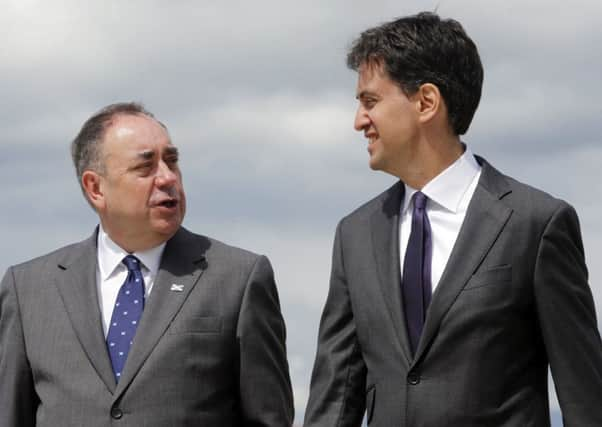Tom Peterkin: Will Labour make a deal with the SNP?


The frustration of Scottish Labour politicians is palpable when it comes to suggestions that Ed Miliband might end up going into government with the SNP.
Their frustration at the thought of doing a deal with their sworn enemies is almost matched by their frustration that the very idea of a Labour/SNP pact continues to linger.


Advertisement
Hide AdAdvertisement
Hide AdEd Miliband’s failure to comprehensively rule out a deal means that he is now under intense pressure to do so.
“I think there is frustration and irritation that the Miliband press operation doesn’t buy a plane for sky-writing purposes and say: ‘There is no deal’,” one Labour MP told Scotland on Sunday.
A recent television appearance that saw the Labour leader dodge the chance to categorically banish all thoughts of a deal has allowed the notion to fester.
His critics feel such ambiguity can only benefit an SNP that knows there is political advantage to be gained by encouraging suggestions that it can keep the Conservatives away from power by propping up a Labour regime.
The SNP is prepared to foster the idea of a Labour deal despite its own deep-rooted aversion to Miliband’s party.
It is a rivalry that has only intensified in the heat of last year’s long and ferocious referendum campaign. Having emerged battle-scared from the September poll, the hostility has not lessened. A resurgent SNP, buoyed by a remarkable influx of new members, is more determined than ever to crush Labour at the general election.
Meanwhile, Scottish Labour with a new and energetic leader in Jim Murphy is moving off the back foot it somehow found itself on despite being on the winning side in the referendum.
In the context of two parties wanting to knock lumps out of each other in the general election, it is difficult to imagine them working together to govern at Westminster.
Advertisement
Hide AdAdvertisement
Hide AdBut with polls indicating that the May election is likely to deliver a hung parliament with the SNP dramatically increasing its number of MPs, it looks entirely possible that the Nationalists could be the kingmaker. There are even suggestions that they could find themselves in government with Alex Salmond running the UK as Deputy Prime Minister.
For the SNP, at least, the idea of some sort of Faustian pact with Labour is absolutely critical to its general election strategy – whether or not it will actually happen.
From the outset of her tenure as First Minister, Sturgeon has indicated the SNP would be prepared to work with a Labour government that fell short of an outright majority.
Sturgeon has taken care not to rule out a formal coalition with Labour. But SNP strategists believe that a “confidence and supply” arrangement that stops short of a full-blown coalition is a more plausible arrangement.
Confidence and supply would see the SNP support Labour on its budget and on any votes that the other parties propose to bring down the government.
That sort of deal could be done in return for Labour giving policy concessions to the SNP.
Last week saw a couple of developments that were interpreted as preliminary manoeuvres in what is likely to be a tense and fractious courtship.
Firstly, Sturgeon performed a notable U-turn when she said SNP MPs would drop their policy of not voting on English health issues because NHS funding south of the Border had an impact on Scotland’s budget.
Advertisement
Hide AdAdvertisement
Hide AdThe abandonment of the SNP’s principled stance not to interfere south of the Border has opened the door for the Nationalists to working with Labour on English issues.
Secondly, a majority of Labour MPs abstained on an SNP motion urging the Trident nuclear weapons system be scrapped.
With protecting health and scrapping Trident key items on the SNP’s policy shopping list, Conservatives were quick to claim that a deal would be in the offing in the event of a hung parliament.
Having decided that it can vote on English health affairs, the SNP will go into talks offering Labour support on Miliband’s plan to repeal the coalition’s Health and Social Care Act 2012.
Labour has been critical of the controversial legislation which has led to heavy private sector involvement in the NHS south of the Border.
“We will vote for NHS restoration in England to help protect our budget,” a senior SNP source said. The SNP has argued that “privatisation” of the English NHS would result in Scotland’s budget decreasing under the Barnett formula.
“If Labour required SNP votes to do that, these votes would be available,” the source said.
Trident, for so long a bête noire of the SNP, is emerging as a red-line issue in any potential deal.
Advertisement
Hide AdAdvertisement
Hide AdThe SNP’s stance is that it will not countenance the renewal of the weapons system housed on the Clyde. Labour’s official position is that it is committed to a “continuous at-sea deterrent” with Trident included as part of the next Strategic and Defence Security Review.
Last week, a range of mainstream Labour MPs – along with former Labour defence secretary Lord Hutton of Furness – dismissed a shift on Trident as a non-starter that would be unacceptable to many Labour backbenchers. SNP politicians, however, believe they can bring Labour round to their position.
“We don’t see that we can go ahead with the renewal of the Trident system,” the SNP source said. “If Trident renewal were dropped that would save the Westminster government from itself – both on defence grounds and affordability grounds. Trident makes absolutely no sense at all. Our policy would carry huge support south of the Border and it would get Westminster off the Trident hook.”
The source added: “Would there be support for that in the Labour Party within the Greens and Plaid Cymru? I think there would be.”
A similar attempt to hold Labour to ransom would be made when it comes to the austerity agenda.
With the UK’s public finances still in a perilous state, Ed Balls appears to have accepted the framework of Conservative austerity plans, including welfare cuts, albeit on a smaller scale.
The SNP, however, maintains that a Keynesian-style cash injection is the best way to grow the economy.
Balls’s approach has irritated many of his back-benchers, giving the SNP hope that it can move Labour in its direction.
Advertisement
Hide AdAdvertisement
Hide Ad“We don’t believe Labour are fixed on that territory at the moment,” the SNP source said. “Would there be an appetite to change that within the Labour Party? Absolutely.”
Over the coming weeks, the SNP will flesh out the detail of the welfare plans and economic policy it believes could come to the fore in a deal.
The other side of the coin is that failure to persuade Labour on that issue could see the SNP tied into a pact associated with unpopular cuts.
Inevitably, the constitution will play a prominent role in any talks with Labour. On this subject, it is Salmond who has made the running, despite no longer being a holder of high-office.
His declaration that independence was off the table for the general election and his pledge to fight for his vision of home rule sets out the SNP’s negotiating petition.
In the short-term, Salmond wants a settlement that sees everything devolved to Edinburgh apart from foreign affairs and defence.
But Labour, the Conservatives and the Liberal Democrats are united behind the less radical “more powers” package outlined by the Smith Commission and published as draft legislation last week.
But needless to say, for the SNP, hope springs eternal.
“Home rule is part of the platform we will put forward,” the SNP source said.
Advertisement
Hide AdAdvertisement
Hide Ad“Within the context of the UK, home rule does what the Smith commission doesn’t do, which is to bring some kind of resolution to devolution. Otherwise it is [a] process that will require to continue to go on because, while powers are ceded in some areas, control is exerted in others. Therefore it is not an enduring thing. So long as there is devolution, home rule is durable in a way that what was published this week isn’t.”
But having been on the winning side in a referendum, Labour is almost certain not to budge any further on the constitution.
If and when talks begin, the SNP will also attempt to safeguard Scotland’s place in Europe.
Among its list of demands will be the introduction of a legislative clause which states that in the event of an in-out EU referendum all four UK nations would have to vote for withdrawal before the UK could exit.
Linked to this is the possibility of the SNP working with Labour to accept Gordon Brown’s idea of a US-style elected senate of the “nations and regions” to replace the House of Lords.
As with any marriage the big question is whether it will actually work. As the anti-SNP attitude of Labour MPs and MSPs demonstrates, there are huge question marks over whether the couple will even make it to the church – never mind down the aisle.
A marriage of convenience may be convenient for the SNP, but Labourites are deeply uneasy about the SNP’s insatiable demands and the Nationalists’ ultimate goal of breaking up the United Kingdom.
That is why there is so much unease about Miliband’s apparent reluctance to issue an unambiguous statement ruling out working with the SNP.
Advertisement
Hide AdAdvertisement
Hide AdCould it be that the Labour leader is simply keeping his options open ahead of the most uncertain general election in recent history? After all, coming to an arrangement with the SNP could deliver the keys to Whitehall and keep David Cameron from securing a second term.
But as far as Miliband’s colleagues are concerned, the clamour for him to dismiss the SNP’s overtures is getting louder.
Last week Balls insisted during an interview with LBC that he did not want a coalition with the SNP. But when asked to “rule out” the possibility he said he would leave it to the party leader, adding: “I’m not going to make some sort of categorical announcement today because that’s not my place, but I’ve got as close to saying ‘no’ without saying ‘no’.”
One Labour MP summed up Labour’s current predicament saying: “We have found ourselves in a situation where if someone other than Ed [Miliband] rules it out, it looks as if they are undermining him.”
Miliband’s MPs are also acutely aware that the thought of an SNP/Labour deal is difficult for those representing northern England. Beyond the Watford Gap, there is a strong perception that Scotland is indulged by the political classes at its expense. It would be difficult for Miliband to sell a government with a Scottish tail wagging a Labour dog to the people.
But as long as Miliband allows the concept of a deal to be a live issue, Sturgeon will continue to argue that a vote for the SNP in Scotland can get rid of Cameron and deliver a Labour government at Westminster.
The SNP is hopeful that this is an effective antidote to Murphy’s counter-argument that only a vote for Labour can ensure Cameron’s departure from Downing Street.
Amidst all this talk of the SNP and Labour, there remains a certain irony. The SNP has declared that the Tories are beyond the pale and ruled out any form of deal with Cameron.
Advertisement
Hide AdAdvertisement
Hide AdBut in some ways the most profitable outcome for the Nationalists would be an SNP resurgence destroying Labour in Scotland to ensure a Conservative government in London.
That would enable the SNP to step up its argument that Scotland and England are set on divergent political paths. In which case, the SNP can step up its argument that the only way to resolve this parting of the ways is through their raison d’être – Scottish independence.
FOLLOW US
-----------------------------------------
-----------------------------------------
SCOTSMAN TABLET AND MOBILE APPS